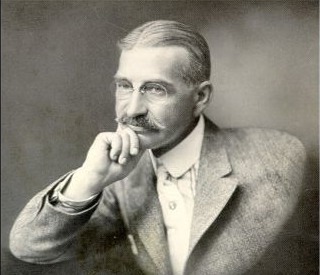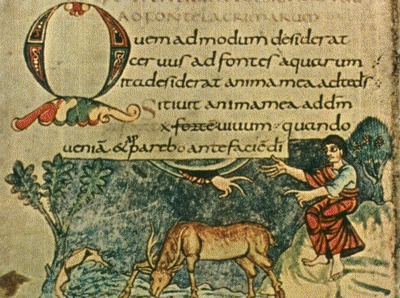L. Frank Baum's The Wonderful Wizard of Oz exemplifies and helps
drive home this point. It's an outstanding example of how and why fiction
opens the door for authors who seek to write creatively...because fiction is
a hotbed for the imagination.
Baum wrote the original Oz book and almost twenty additional books in the
Oz series. His series has inspired countless book and movie adaptations by
others, and new adaptations are being produced today, over 100 years later.
Baum's works are among the most-adapted works in the
lexicon of fantasy.
That's a picture of Frank Baum at the right, below. Notice his eyes.
about Fantasy and fiction
What is fantasy? Fantasy is a fictional genre not unlike the science
fiction genre. But unlike science fiction, it uses magic and other supernatural
phenomena instead of science as a primary element of plot, theme, or setting.
Horror is another genre that's similar to fantasy, one that uses horrific
plots, themes, and settings as elements instead of fantasies.
Fantasy writing has been with us for a long time. Witness Homer's
Odyssey; witness also the six mechanicals in A Midsummer Night's
Dream, the amateur actors controlled and manipulated by the fairies who
inhabit the forest in which most of the play is set. Also witness Prospero
the magician in The Tempest, as well as other Shakespearean dramas.
Witness Christopher Marlowe's play The Tragical History of Doctor
Faustus and Edmund Spenser's epic poem and fantastical allegory, The
Faerie Queen. And don't overlook Anglo-Saxon myths like Beowulf.
But Fantasy is also very recent and very contemporary, too. Witness Mary
Shelly's Frankenstein, J. R. R. Tolkien's The Hobbit and
The Lord Of the Rings trilogy, The Chronicles of Narnia by C. S.
Lewis, E. R. Eddison's The Worm Ouroboros, Terry Pratchett's
Discworld series, and the Harry Potter novels of J. K. Rowling.
And let's not don't forget Dr. Seuss (pen name of Theodor Seuss Geisel).
He's usually thought of as a writer of children's books, although his body
of work also can be classified as Fantasy.
Let's face it, Fantasy was and still is one of the best literary genres
going.
Let's consider The Wizard of Oz
is an example of a movie fantasy; his books The Wonderful Wizard of Oz is an
example of prose fantasy.
Baum wrote the first book about OZ that appeared anywhere in the world;
it was unique when it appeared. The premise and story were original; he invented
and developed the world of OZ, Dorothy, and its other characters, and
harmoniously melded them on paper together. The Oz story has become a
legend. It's imaginative, thoughtful, and
excellently written. For these reasons and more, the Oz book ranks as a
quintessential work of creative writing, a consummate work of Baum's
fantastic imagination.
Baum's many accomplishments mark him as a creative genius. He not only wrote the many additional works in the Oz series,
he wrote a large number of other works in a variety of other genres as well, far too many to mention here.
He wrote books, short stories, and other kinds of publications, both
fictional and nonfictional.
- Explore Baum's life. See an exhaustive bibliography of Baum's Oz
works and his many other works; see a list of some of the adaptations that
his works inspired. Visit the Wikipedia page on his biography titled L. Frank Baum:
click here.
 |
| L. Frank Baum, author of The Wonderful Wizard of Oz,
published 1900 |
about science fiction
Like Fantasy, Science fiction (SF) is a fictional genre treating
imaginative content that does not actually exist in today's real world.
Subjects, environments, scenes, and other elements are partly the imaginary
creations of authors.
It differs from fantasy in that the subjects, objects, environments, and
situations it addresses may consist of futuristic settings, futuristic
science and technology, space travel, time travel, faster than light
travel, parallel universes, other worlds, and extraterrestrial life, among
others. Creatures who participate in actions and events may or may not be
intelligent, and may be humans or aliens.
Science Friction is a relatively new genre, which came about in the
1920s with the rise of science. New science arouse new interest among
writers. But it can be traced back a long way??????)
Modern Science Fiction stories speculate about and explore the workings
of mythical worlds constituted and constructed with components,
characteristics, and situations such as those just mentioned, worlds that
are theoretically possible, at least in the author's imagination, but that
do not (or may not) actually exist. They explore and develop the possible
outcomes and consequences that might result.
Science Fiction's primary aim is to investigate and understand current
or projected real world conditions that are analogues to those imagined by
the author. It intermixes mythical or theoretical topics, people, world
conditions, lifestyles, and other phenomena that actually do exist today in
the real world with theoretical ones in order to strike parallels that
illuminate the real world. Thus it's main purpose, emphasis, and focus is
on exposing and understanding today's world.
Much Science Fiction is expressly focused on exploring the potential
consequences of scientific, engineering, and other technical innovations.
Authors commonly found their ideas on actual science that exists today or
that may soon exist. They extrapolate current science to future frameworks
in which they examine subjects such as future politics, personal identity,
desire, morality, social structure, and other typical, conventional
literary themes.
But in some cases the personal scientific and technical interests of the
author overcome and intervene, causing him to digress from his primary
objectives and to dwell overlong on the science in his science fiction. In
departing from his central theme and primary objective in this way, SF
authors sometimes produce poorly written stories and badly constructed
literature.
There are two major fields, styles, or types of science fiction
literature: Hard and Soft.
Hard Science Fiction is characterized by rigorous attention to accurate
and correct detail in the natural sciences. Writing like this is set
especially in the fields of physics, astrophysics, and chemistry. In some
cases it's as if the author writes science fiction in order to gain an
audience for the science he personally loves and to share it with others.
In other cases it's as though the author seeks to capture his reader's
interest by telling a good story, but with a hidden agenda. He enlightens
his reader about his science because he wants to argue and win a cause and
gain his support. Famous hard science creative fiction authors include
Isaac Asimov, Arthur C. Clarke, and Hal Clement.
Soft Science Fiction is characterized by stories focused primarily on
character and emotion. Writing like this is set especially in the fields of
social sciences, and in subfields such as psychology, economics, political
science, sociology, and anthropology. It seems that many writers who
specialize in soft science fiction prefer to exploit science primarily as a
means to tell good stories about engaging topics in interesting settings.
Famous soft science creative fiction writers like these include Ursula K.
Le Guin, Philip K. Dick, and Ray Bradbury.
Other Soft Science fiction creative writers use science as a means to
inform or warn their readers about their own fears and hopes for the
future. Utopian and dystopian stories are two noteworthy subgenres of
social science fiction that share this aim. Examples of dystopias are
George Orwell's Nineteen Eighty-Four, Aldous Huxley's Brave New
World, and Margaret Atwood's The Handmaid's Tale.
crossovers
Satirical novels with fantastic settings such as
Gulliver's Travels by
Jonathan Swift may also be considered either science fiction or
speculative fiction.
Although extremely modern, having been invented in the 20th century
along with the rise of science, as with Fantasy, SF also goes back a long
way. Cite examples.
Science Fiction literature is similar to Fantasy literature in that it
speculates about subjects, people, world conditions, lifestyles, and other
phenomena that do not actually exist but are conceived and imagined by the
author.
both are other worlds
Thus, at heart the Science Fiction literature domain is actually a
combination of fictional and nonfictional elements. It differs from the
Fantasy literature creative domain genre in that
objective of
, and has been called a "literature of ideas".
Some creative writers blur the boundaries between hard and soft science
fiction. Others blur the boundaries between Fantasy and Science Fiction.
Some blur both boundaries. Jonathan Swift's satirical highly creative novel
Gulliver's Travels is an example of a highly creative work that
blurs both. It has fantastic settings and scientific elements that may be
considered science fiction.
about the speculative
fiction genre
As already noted, The Wonderful Wizard of Oz belongs to a
relatively narrow (but still broad) field of genre writing called
fantasy. The even broader field of genre writing that fantasy belongs
to called speculative fiction. If fiction is a hotbed for fantasy,
it's a steam bath for speculative fiction.
Today, works of fantasy like Oz are usually classified along with science fiction
and horror as one of the
subgenres of speculative fiction (a.k.a. Spec Fiction).
Fantasies are set in imaginary worlds where magic is common. Although there's a great deal of overlap between these three speculative
fiction subgenres, the fantasy genre is clearly distinguished from science
fiction and horror by the fact that it steers clear of pseudo-scientific
and macabre themes.
Oz exhibits the properties that characterize the fantasy literary genre.
The rules of cause and effect that make the story advance are based on
magic, not science or horror. It's premise is completely fictional, making
it a work that is totally a product of Baum's creative imagination. These
properties place it squarely at the center of the fantasy literary genre.
- Fantasy is a subgenre of the speculative fiction supergenre. Explore
the nature of fantasy, horror, and
other speculative fiction subgenres at greater length at The Muse Of
Literature's feature titled Welcome to the
World Of Speculative Fiction Literature:
click here.
The Spec Fiction genre is an active field that's still evolving; writers
are producing many new and original works. Readers and writers are talking
about writers and works and publishers are reacting to what's happening; there's much to discuss.
The speculative fiction genre illustrates how important the role of
aesthetic creativity can be in genre writing. Fantasy, science fiction,
horror—indeed, all the spec fiction genres—are
intensely creative. The Muse encourages you to join the ranks of
those active in the field and monitor what's going on.
Fantasy is a subgenre of the speculative fiction super-genre. So is
science fiction. Explore the Speculative fiction genre. The Muse Of Literature welcomes you to the World Of
Speculative Fiction, the amazing, sometimes shocking, awe inspiring world of
science fiction, fantasy, and related fictional genres.
Embroil yourself in The Muse Of Literature's Speculative Fiction Blog.
fantasy, horror, and other speculative fiction subgenres. See what's going
on.


